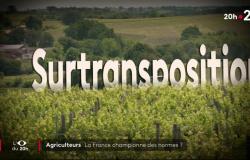While the first snowflakes are expected in the middle of the week in Côte-d’Or, the departmental council presented, this Monday morning in Dijon, its winter viability system for the road network. A system activated since November 15 and until March 17, 2025, which mobilizes dozens of agents on the ground to ensure maximum safety for motorists who use, every day, the approximately 5,710 km of roads including the community is responsible. Departmental roads for the vast majority.
Two cameras along the A38
But also 36 km of expressways that the Department took back into its fold on January 1st. Namely the A38, renamed “La Côte-d’Orienne”, which connects the Dijon metropolitan area to the A6, at Pouilly-en-Auxois. An axis along which two new cameras will come into service at the beginning of December, bringing to 25 the number of lenses focused on the roads managed by CD21. The images are supervised, in real time, from its traffic information and management center (CIGT), based in Dijon.
“Despite the degraded financial context, this network will be maintained”
“This system, lasting four months and which can be reactivated at any time outside this period, mobilizes our services 24 hours a day, 7 days a week. It is based on a territorial network made up of five agencies and 32 technical service points, distributed throughout the department. And despite the degraded financial context, this network will be maintained,” insisted the president of the community, François Sauvadet.
187 people mobilized
“This requires significant human resources, thanks to 187 people mobilized throughout the winter. First of all, there are 110 agents from the Department, but we also benefit from the reinforcement of private companies in certain sectors, which we call upon in the event of serious difficulties. Without forgetting the partnership that we have established with 55 farmers, who can provide support on what we call ”the last meter”. »
10 390
Like the number of tons of salt that the departmental council has in stock to treat the roads this winter, as well as 496 m3 of brine (salt/water mixture).
If the agents – and their 145 intervention vehicles – constitute the armed wing of road maintenance in winter, digital tools also play a big role in this critical period. At CIGT, an interactive map allows you to visualize the entire road network and any black spots. Then update the site inforoute21.fr, which allows each user to know the upcoming difficulties on their route.
“The objective is that no municipality finds itself isolated”
“When a weather situation deteriorates, we must prioritize our interventions. First there are the major structuring routes, the busiest, which represent around 20% of the network and which are cleared of snow and ice 24 hours a day, 7 days a week. Then there is the intermediate network, which comprises 35%. of the network and which is processed every day from 6 a.m. to 9 p.m. Finally, the remaining 45% is cleared of snow and salted at specific points. The objective being that no municipality finds itself isolated,” recalls François Sauvadet.
If the safety of motorists is a priority, so is that of those who maintain the roads. They are now equipped with connected watches, which launch an automatic emergency call in the event of inactivity for more than three minutes. Additional insurance for these men and women who carry out often dangerous missions. As such, the Department recalls some essential rules, such as “facilitating the work of personnel responsible for snow removal”, but also “giving priority to snow removal machines and never attempting to overtake them”.
To find out about the state of the road network, log on to inforoute21.fr or call 03 80 63 30 63. A daily update is also carried out every morning, Monday to Friday at 7:35 a.m., on France Bleu radio. Burgundy.
Belgium






